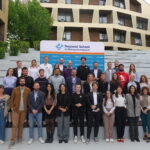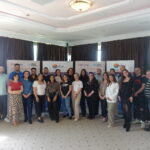
Program description
European integration and local development – towards successful strategies and good governance (2008 – 2013)
Events in this program
Yearly, BFPE realizes more than fifty various events: conferences, round tables, panel discussions, consultancy, workshops and simulations.
Analysis and Publications
All our analysis in a single place: analysis; policy proposals; analytical reports from our events.
Program description
The main objective of the project “European Integration and Local Development – Towards Successful Strategies and Good Governance” is to strengthen the capacity of decision makers in local communities of certain regions in Serbia for the European integration processes.
The capacities of decision makers at the local levels of governance are not sufficiently developed. There is need for a European Union policy in various areas which are “closer” to key stakeholders in the local community. The commitment of our state for European integration, as well as the launch of negotiations, opens the need for intensive training and informing decision-makers in all sectors and levels of governance, especially in local communities with different aspects of the policy of the European Union. Local governments have an important role in European integration as the most frequent place of interaction with the institutions and citizens because they are all actors of the reform processes which demand knowledge required for the operationalization and implementation of EU policies. After the general elections of 2012 and the beginning of the negotiation process in 2014, this need is even more notable, because the structure of the municipal government is such that a number of people who make decisions do not posess insufficient knowledge and skills in the implementation of EU policies.
Project activities are attended by 40 individuals from one particular region of Serbia who are representatives of the local government units (mayors, members of municipal councils, councilors, representatives of the municipal administration), media representatives, NGOs, public companies, institutions and the business community.
Participants in the project cycle of seminars for each region individually, which consists of four three-day modules, receive and acquire knowledge and skills in different areas important for the process of European integration of our country.
This Project began to develop in the second half of 2008 and until the end of 2013 included the following geographical areas and local communities:
- Sandzak (Southeast Serbia): Nova Varos, Novi Pazar, Priboj, Sjenica and Tutin (2008/2009).
- South Serbia: Bosilegrad, Bujanovac, Vladicin Han, Vranje, Medvedja, Surdulica, Trgoviste and Presevo (2009/2010).
- South Banat (Vojvodina): Alibunar, Bela Crkva, Kovačica, Kovin, Opovo, Pancevo, Plandište and Vršac (2010)
- Srem (Vojvodina): Indjija, Irig, Pecinci, Ruma, Sremska Mitrovica, Stara Pazova and Sid (2011)
- Western Serbia: Arilje, Čajetina, Ivanjica, Kosjerić, Užice and Pozega (2012).
- Eastern Serbia: Boljevac, Bor, Kladovo, Knjaževac, Majdanpek, Negotin and Zaječar (2013)
(Appendix: Map of Serbia with the marked areas)
Implementation of the project has so far included a total of six regions, reaching up to 44 local communities (municipalities and cities) and a total of 219 participants / alumni – decision makers from those geographic areas.
An important aspect of achieving the overall goal of this project is to create a synergy of all actors in the local community, representatives of local governments, NGOs, the media, business and the various political parties that perform the function of government, or the opposition. Priority is given to the improvement of inter-municipal cooperation and the development of joint regional projects through a special segment of the project which is continuously implemented in workshops on all four seminars. Project participants in the periods between the seminars, divided into smaller groups worked on joint platforms for the development of inter-municipal / regional projects. For this purpose, seminar participants created Inter-communal projects of interest for their municipalities, standing on special protocols of cooperation (also attached, all in Serbian language).
Decision-makers from local communities who have successfully completed the cycle of seminars – 219 from 240 persons originally invited – have become part of the alumni network of the Belgrade Fund for Political Excellence, which means that BFPE maintains communication with them and includes them in its other programs.








